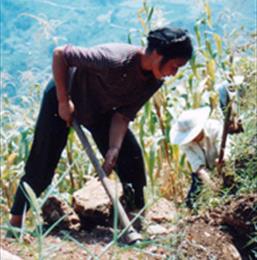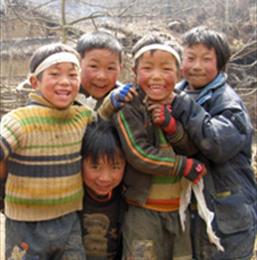Juetuo Village, 1997-2001

Juetuo Village is one of Hanyuan’s 28 particularly poor villages. The average annual income is about 800 RMB per person, and the village has a population of about 588 people. The village is populated by both Yi and Han people.
DORS have two projects in Juetuo Village:
Women's Rural Credit Scheme
As in Sugu Village, DORS have begun implementing a loans project for women in this village. More on the details of the scheme can be found in the Sugu Project Page and in our monthly newsletters.
DORS initially approached the village Party Secretary about the possibility of making loans to women in Juetuo. DORS were already familiar with the village as negotiations were underway for a DORS funded irrigation scheme. A meeting was held in the village school and the scheme was explained to the women. Initial interest was high with 40 women attending.
The women wanted to take out loans for a year and make half yearly or yearly repayments. Loans were not made available to wealthier households or men. The loans could be used for any income generating activity. It was decided that to ensure adequate repayments that they should be made at 6 monthly intervals as a maximum. This was to enable the funds to be circulated to further women in 6 months' time, and also to sustain a lower risk than the one year repayments. Previously in Sugu village DORS had only made loans with repayments due every month, so this was the first time to try the longer repayment time.
 One week later DORS delivered the loans to women in hamlets 2 and 3. Women from hamlets 4 and 5 also came down and received loans. The women organised themselves into groups of five with a mutual responsibilty for the loan repayments. Each small group selected a leader. The village Women’s Cadre was selected by the women as the ‘central leader’. Each woman was asked individually how much she wanted to borrow, what she wanted to borrow the money for, and how she wanted to repay (monthly intervals, six monthly etc.). After choosing a repayment schedule she was then asked how she would make the repayments. Most women chose livestock rearing, with pigs being the most popular choice. All the women chose the six monthly interval repayment schedule, and said they would repay by selling walnuts for the first repayment and selling a fattened pig for the second repayment. A simple contract was signed by the woman, DORS and the small group leader and central leader. Loans were made to the other part of the village a week later.
One week later DORS delivered the loans to women in hamlets 2 and 3. Women from hamlets 4 and 5 also came down and received loans. The women organised themselves into groups of five with a mutual responsibilty for the loan repayments. Each small group selected a leader. The village Women’s Cadre was selected by the women as the ‘central leader’. Each woman was asked individually how much she wanted to borrow, what she wanted to borrow the money for, and how she wanted to repay (monthly intervals, six monthly etc.). After choosing a repayment schedule she was then asked how she would make the repayments. Most women chose livestock rearing, with pigs being the most popular choice. All the women chose the six monthly interval repayment schedule, and said they would repay by selling walnuts for the first repayment and selling a fattened pig for the second repayment. A simple contract was signed by the woman, DORS and the small group leader and central leader. Loans were made to the other part of the village a week later.
Altogether loans were made to 95 women which is just under two thirds of the total number of households. Loan sizes were mostly 800 to 1000 RMB each. The management fee of 50 RMB per person is to be repaid in two parts. One month after the loans were disbursed, DORS visited Juetuo to check that the purchases had been made. Approximately one third of the households were visited and were found to have made their agreed purchases.
Repayments after the first 6 months were good, but the second repayments were not made in full by all the participants. Various reasons were given, and the repayment dates for these women were rescheduled.
To keep up to date with the project, check out our monthly newsletters.
Irrigation Water Supply Project
 At present only hamlets 4 and 5 have sufficient water available for irrigating their land. Hamlets 1,2 and 3 all have very small areas of paddy. However, these three hamlets all have further land which could be used for paddy cultivation were sufficient water available. Two designs for irrigation water supply projects have been drawn up by the village with technical assistance from the County Water Conservancy Bureau and the Transport Department.
At present only hamlets 4 and 5 have sufficient water available for irrigating their land. Hamlets 1,2 and 3 all have very small areas of paddy. However, these three hamlets all have further land which could be used for paddy cultivation were sufficient water available. Two designs for irrigation water supply projects have been drawn up by the village with technical assistance from the County Water Conservancy Bureau and the Transport Department.
Thanks to a 69,633.5 RMB (£5,360) donation from the Methodist Relief and Development Fund, DORS has been able to agree to fund these projects. The first project aims to supply water to hamlets 2 and 3 for the irrigation of 50 mu of land close to villagers homes.
The second project, which will begin once the first is completed successfully and within budget, involves piping water across the Dadu River valley to irrigate approximately 100 mu of land belonging to hamlet 1. Both plans are described below:
Juetuo Hamlets 2 and 3 Irrigation Water Supply
This project will involve re-channelling a mountain stream into the existing irrigation channel at hamlet 4, thus increasing the water available. That part of the water not already used for irrigation by hamlets 4 and 5, will then run down a gully, flow along a new channel by the road before being channelled into the village paddy land. The construction will be carried out in two stages:
Stage one : A 100m cement lined channel is to be built from the new mountain stream source to a small storage tank. A 150m plastic pipe will then be suspended from a steel wire across a small valley to another small tank built next to the existing irrigation channel. This channel’s wall will be heightened to accommodate the increased supply of water.
Stage two : A new 2,600m cement lined channel will be built alongside the road by hamlets 2 and 3 which to take water coming down the gully. Further channels to take the water into the fields will also be constructed.
The local Water Conservancy Bureau designed the plan in conjunction with the villagers. The Transport Department assisted with the design of the suspension wire and piping across the small valley. The Transport Department also gave their approval for the channel to be built alongside the road by Hamlets 2 and 3. The construction will be carried out by the villagers of Hamlets 2,3,4 and 5 (who will all benefit from the increased supply) and will be managed jointly by Juetuo village Party Secretary and the two hamlet leaders of hamlets 2 and 3.
An adequate irrigation water supply will be secured for the 304 people in Juetuo Hamlets 2 and 3. Hamlet 2 will have an estimated increase of 20 mu (1.3 ha) of paddy land, in hamlet 3 the increase will be of 30 mu (2 ha), significantly improving the grain yield of the village, ensuring there is sufficient grain for the year. The increased supply will also mean there will be more water available for the households in hamlets 2,3,4 and 5 for growing fruit trees and raising livestock. Hamlets 4 and 5 will also be able to use the water to generate electricity, using the hydro-power generators recently installed in the village.
The project in hamlets 2 and 3 began in August 1998.
Project completed.
Juetuo Hamlet 1 Irrigation Water Supply
This project will involve re-channelling a mountain stream on the opposite side of the Dadu River valley to a point opposite hamlet 1. A suspended pipe will take the water across the valley to another lined culvert that will channel the water into the village paddy land. The construction will be carried out in 3 stages:
Stage one : A 600m cement lined channel is to be built on the other side of the valley. A small tank will also be built to reduce the pressure of the water entering the pipe.
Stage two : A 530m steel wire will be anchored in place spanning the valley. 520m of piping will be suspended from this wire.
Stage three : Another small tank will be constructed on the village side of the valley and a further 200m of cement lined channel will be built to take the water to the village fields.
The Transport Department and the villagers have drawn up a plan, which the Water Conservancy Bureau have also approved. The construction will be carried out by the villagers of hamlet 1, and will be managed by Juetuo village's Party Secretary.
This should secure an adequate irrigation water supply for the 203 people of Juetuo hamlet 1. There will be an increase of an estimated 100 mu (6.6 ha) of paddy land for the hamlet as a whole. The villagers will be able to grow two crops each year (rice and winter wheat) on this land, significantly improving the grain yield of the village and thereby ensuring there is sufficient grain for the year.
Project under construction
Assisting Schoolchildren - DORS Education Project
As part of our integrated approach to tackling the problems in Hanyuan's villages, we provide short-term assistance to those children from our project villages who do not have the opportunity to attend primary school because their families cannot afford the mere 200 RMB primary school fees. We expect that through the other projects implemented in a particular village, such as the irrigation water supply projects and the women's rural credit scheme, lasting improvements will be achieved, and in time, families will be in the position where they can afford to pay their children's school fees themselves. DORS have been providing assistance since Feb 1998 to poor children from Juetuo who would otherwise not attend school.


